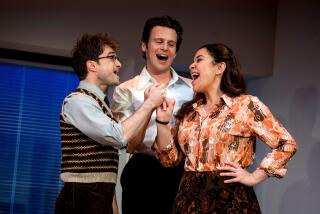Eternal Triangle Is Given Twist of the ‘70s in ‘Friend’
- Share via
Friend of the Family by Natalie Bates; (Atheneum: $16.95; 256 pages)
Annie Morrow lives with her handsome and charming husband, Michael, in Los Angeles, in 1973, and the year here is important. Michael and his best friend, David, are restoring a movie theater, turning it into a revival house for all the marvelous old cinematic classics. It’s unclear when Michael met David, because the Morrows have only recently moved to Los Angeles from New York and Annie herself is bitterly lonely.
She cooks and cleans and takes her children to the park; she spends unsatisfactory time with her only friend, Maggie, who’s going through hell with her compulsively womanizing husband. Along with that, Annie tries to figure out why Michael hasn’t made love to her in more than 21 days.
Study in Denial
The reader knows the minute the family friend, David, lounges up against the kitchen sink with a baguette, or offers to help Annie make the salad, that Michael and David are lovers, but “Friend of the Family” is a study in denial, a Zen exercise in ignoring the obvious. It is set in that terrible six months that end a marriage, when time slows down and the characters move in a sticky, unimaginably awful dream; where every gesture, every ploy, occurs on the emotional emergency network association: THIS IS A TEST.
In many ways, it doesn’t matter here if Michael is gay or not. He’s simply a guy who’s trying with all his might and cunning to have it both ways. In most divorces isn’t there often a magic moment when the erring husband turns to everyone concerned and says, “Wouldn’t it be nice if we could all move in together?”
He ‘Loves’ His Wife
In this particular case, Michael desperately wants to keep Annie and the kids, (a) because he’s a good father and “loves” his wife, and (b) if he’s left with just David, that would be admitting that yes, he’s gay. (Remember, the year is 1973. The whole point of the sexual revolution was to have as much freedom as possible, but to be sure that your family, your mother for instance, never found out.)
Annie discovers that Michael is gay in a perfectly appropriate way. David discovers that Michael has been cheating on him and for about a 30th of a second the two spurned lovers, Annie and David, find themselves in the same boat. After the discovery, the nightmare slows to an agonizing crawl. In rational terms, Annie should kick Michael out, get a job, take some classes at a community college, join a support group, borrow some money from her folks, “get on her feet.”
But Michael says he loves her! David says he loves her! She’s indispensable! And she loves her home. There’s a point when Annie says to Maggie, “Michael says the affair is almost finished, and I believe him,” and Maggie just looks at her. (Of course, for a long time, Annie neglects to tell Maggie that her rival for Michael’s affection is a guy.)
Annie refuses to believe it, any of it, even though the two men take her to gay clubs, where she announces repeatedly, to anyone who will listen, “I’m Michael’s wife . . . .” And in one of these night spots, Annie sees a woman in red who’s at ease in this exotic world. In ghost form this woman gives Annie lots of bad advice. “If he goes away, you will be left alone” is about the most cogent.
More to Read
The biggest entertainment stories
Get our big stories about Hollywood, film, television, music, arts, culture and more right in your inbox as soon as they publish.
You may occasionally receive promotional content from the Los Angeles Times.










